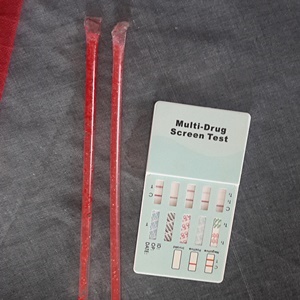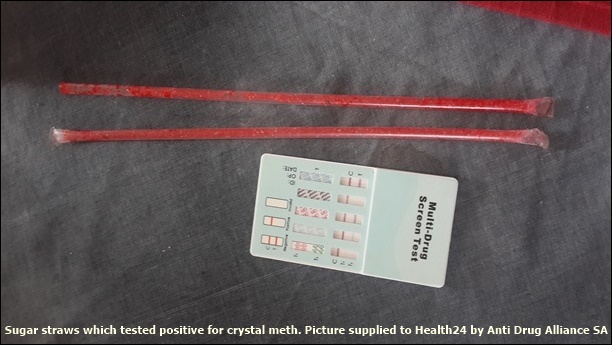
The sugar straws come in four flavours – strawberry, creme soda, bubblegum and caramel – and are giving school children in Johannesburg a rush that only lasts a few seconds, but which is followed by a high which lasts for several hours.
It sounds like a drug – and it is!
At just R5, "strawberry quick" contains a mixture of crystal methamphetamine, sugar, food colouring and flavourants, and has children as young as 10 years all the way through to 18 in a "fix".
"Strawberry quick got its name from an urban legend, which became an actual reality in Johannesburg," Quintin van Kerken from the Anti Drug Alliance SA told Health24.
The original urban myth of flavoured methamphetamine being handed out in schools and mistaken for sweets is thought to have originated in the United States, and was recognised as a hoax. But things have changed . . .
Read: Tik: is your child at risk?
Van Kerken explained that innocent learners are initially led to believe they are buying sweets, and once they become hooked are converted into buying pure crystal meth, which can be found in many forms, from a fine powder to larger crystals. It can be snorted, orally ingested, injected and smoked.
He said in most cases the straws are sold by dealers posing as sweet vendors outside or in close proximity to a number of primary and high schools in Johannesburg.
'That's where the profit lies'
He said prices vary dramatically. "Some dealers give them away for free the first few times, while others sell them from R5 to R30."
It all boils down to the dealer getting children addicted to crystal meth, he said. "That's really where the profit lies."
Picture gallery: The faces of addiction
Van Kerken said there have also been scattered and unconfirmed reports of strawberry quick in KZN and two confirmed cases in the Western Cape.
Parents are urged to be alert and get help immediately if their children have fallen victim to drug use.
These are the signs of crystal meth abuse:
- Loss of appetite and weight loss
- Aggression
- Dilated pupils
- Rapid speech
- Anxiety
- Psychotic symptoms (hallucinations and delusions)
- Headaches
- Over-confidence
- Insomnia
- Changes in dress, friends and slang
Substance abuse in Gauteng
Although 6,850 people were treated in Gauteng for substance abuse last year, only 249 had used crystal meth, according to the South African Community Epidemiology Network on Drug Use (SACENDU), which monitors alcohol, tobacco and drug abuse treatment admissions in South Africa.
The figures for the period from January to December 2014 showed that cannabis is the primary substance of abuse for people aged 20 years and younger in the province.
SACENDU recorded that 40 students/pupils were treated for substance abuse with 20 referred by schools.
In the age range of 10 to 14 years, the number of patients in treatment was 242, while in the 15 to 19 year age bracket there were 1 446 patients in treatment.
Read: Is Nyaope SA's worst drug?
"Youth abusing crystal meth in Gauteng are not reporting for treatment," Dr Nadine Harker Burnhams, senior scientist at the Medical Research Council's Alcohol, Tobacco and Other Drug Research Unit, told Health24.
"It could mean that school children are not presenting for treatment or the problem is not being picked up by parents who would seek help for their children."
She noted that the number of users seeking treatment for crystal meth in Gauteng remains small when compared to the Western Cape where the drug is more prevalent.
Why children experiment with drugs
Clinical Psychologist Dr Neíl McGibbon told Health24 that young people, and in particular adolescents, are developmentally in the phase of life associated with the highest levels of risk-taking.
He said this can also be complicated by a number of other factors including:
- Genetic predisposition to addiction and substance abuse
- Familial and social environment
- Peer and friendship groups
- Interpersonal difficulties and untreated mental health problems
- Disillusionment and feelings of disenfranchisement
To help create awareness of substance abuse, McGibbon recommended that age-appropriate informative drug education must be prioritised.
"Young people need to be fully informed regarding the risks associated with specific drugs. While there is an emphasis on prevention, we need to be realistic that drug experimentation goes on and will continue to do so.
Read: Addiction harder to treat in teen girls
"Therefore drug education should also include knowing the risks, including consequences of illegal drug use, so that if someone decides to experiment they have the facts," he said.
However, McGibbon said that people often shy away from this as there is concern that education will promote use.
"Research shows that this is not true. Research also reveals that a lack of education and the use of scare tactics alone does not reduce the possibility of drug experimentation. The best way to keep young people safe is to provide honest factual information."
McGibbon said that learning, memory, concentration, clarity of thought and general cognitive functioning are all negatively affected by crystal meth abuse.
"Sustained use of crystal meth causes significant brain damage," he warned.
The health dangers of meth
Carine Marks, Director of the Tygerberg Poison Information Centre explained to Health24 that Crystal Meth increases the levels of certain brain transmitters, known as catecholamines, resulting in brain stimulation.
"This stimulation can lead to tachycardia, hypertension and agitation. Often the user becomes euphoric and can sometimes present with psychotic behaviour."
She said in an overdose a patient can present with life-threatening symptoms such as hyperthermia, seizures, intracerebral haemorrhage, paranoid psychosis, renal failure, heart dysrhythmias and myocardial infarction (heart attack).
"Death may result from hyperthermia in addition to other complications."
Cardiovascular complications from long-term abuse are common, said Marks adding that bad teeth, skin lesions and poor self-care are common findings with chronic abuse.
She cautioned that infectious complications such as HIV, viral hepatitis and sexually transmitted infections may also develop.
You can contact the Anti Drug Alliance SA in Gauteng on 081 577 7715. Here is a list of drug treatment centres in the Western Cape.
Watch: Strawberry Quick - new lethal drug hits Joburg streets
Drugs a serious threat to street kids




 Publications
Publications
 Partners
Partners











